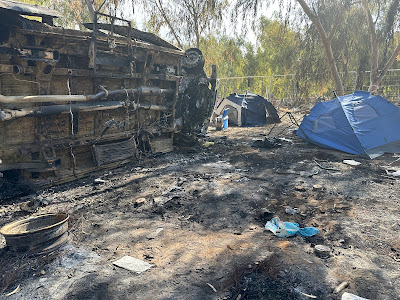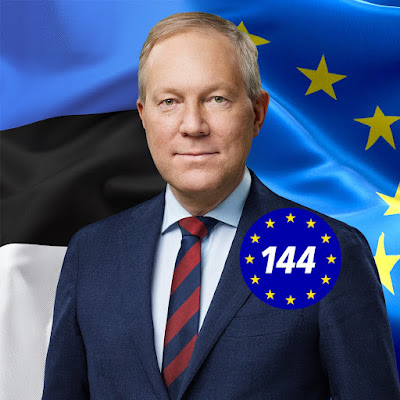ISRAEL – A NEW FRONT IN A WORLD-ALTERING WAR
Hamas, which has been working towards the destruction of the state of Israel since 1987 and has supporters in the aforementioned coalition of intent, achieved several objectives with its attack. Firstly, their well-planned and massive surprise attack succeeded in coming as a total shock to the Israeli society. The last time this many Jews were killed in a single day was in the gas chambers of Auschwitz in 1944 – one can only imagine the atmosphere this attack created among Israeli citizens.
There is not a single family in Israel that does not have relatives who were victims of the Holocaust. Now, such a heinous massacre took place right in their own homes. When I visited the settlements near the Gaza border a few days ago, the nauseating stench of decomposition still lingered in the air, and the scene spoke volumes about the profound tragedy that had occurred.
Secondly, the attackers undermined citizens' belief in the all-powerful intelligence capabilities of Israel and their confidence in the protection offered by the military. Consequently, it can be expected that after the end of the war there will be demands made in democratic Israel to identify the causes of the failure and to hold the culprits accountable. Meanwhile, Israel has rallied under one banner and unanimously demands the elimination of Hamas as a permanent terrorist threat. Unfortunately, the elimination of Hamas can only be achieved through aerial and ground attacks, which also means suffering for the innocent.
Already before the launch of Israel's ground operation in Gaza, the consequences of Hamas's actions have sparked waves of mass unrest and anti-Semitism worldwide. In the Arab world, as well as among the "global south" countries more broadly, this fuels anti-Western sentiment (especially towards the United States) and complicates finding common ground, for example, in standing up against Russia’s aggression in the UN General Assembly.
Israel's forced self-defense makes the normalization of relations with Arab countries unthinkable in the near future; moreover, the overwhelming majority of these have still not even recognized the existence of the state of Israel. It is also likely that the rapprochement between Israel and Saudi Arabia in the spirit of the Abraham Accords will be interrupted.
The behind-the-scenes activities of the "axis of evil" coalition are carried out at full steam and the events are coinciding with their interests. Both Russia and China are well aware that gaining greater influence in the Middle East determines who controls the balance of power in the world. Therefore, it is in their interests to minimize the presence and influence of the United States and Western countries in the broader Middle East. The US withdrawal from Afghanistan certainly encouraged the axis to take action, making it clear that Hamas's attack was the catalyst for a new major escalation. Iran, of course, is the most active in supporting Hamas and Hezbollah (Iran spends an estimated $6 billion annually on supporting terrorism) and is conspicuous in its consistent efforts to destroy Israel, currently sending weapons and reinforcements through Syria and Lebanon, but the other axis countries are also biding their time to pounce.
The Russian leadership has been in direct contact with the Hamas leadership over the past year, and the latter have publicly visited Moscow twice. The KGB/FSB has been actively involved in the creation of the Palestinian "liberation movement" (the PLO and its leader Arafat were essentially the handiwork of the KGB) since at least the 1960s, mobilizing international terrorism and shaping anti-Western narratives through their extensive network. It would be very naive to think that these ties, skills, and interests have disappeared. Immediately before the attacks on October 7, nearly $100 million moved from Russia to the Hamas accounts through cryptocurrency channels. Russia has been actively engaged in carrying out cyber-attacks and spreading disinformation (such as the fabricated story of Ukrainian arms shipments to Hamas). Russia is also banking on the fact that the Israeli government has been very restrained in supporting Ukraine thus far, as Prime Minister Netanyahu has deemed it important to get along well with Russia to prevent the expansion of Iran's presence in Syria.
Recently, Russia has been actively developing relations at the highest level with Iran, China, and North Korea. Moscow has primarily been interested in their military support to maintain the intensity of the warfare in Ukraine. It is now known that all three Russian allies have sent varying amounts of weapons or other military aid to assist the country in its war against Ukraine. Most recently, it was revealed that North Korea had sent 350,000 shells to the Ukrainian front in support of Russian artillery fire. North Korean, Iranian, and even Russian weapons are also part of Hamas's arsenal. An Israeli military officer confirmed this during our recent meeting near the Gaza border.
The appearance of Russian President Vladimir Putin, a war criminal, at the Valdai Discussion Club at the beginning of October clearly hinted that despite significant losses on the Ukrainian front and pressure from Western countries, the Kremlin is convinced of its progress towards its strategic goals. The Russian leadership believes that Europe is under great economic pressure, which in turn undermines open societies and allows for the rise of extreme forces favored by the Kremlin. Putin himself mentioned the Alternative for Germany party, whose popularity is on the rise, and with the foundation of a new party by the very pro-Russian leftist Sahra Wagenknecht, the Kremlin has high hopes for the next elections. This in turn undermines Western unity and stands in the way of agreeing on and putting in action a more robust strategy. Handshakes with Orban only increase the Kremlin's confidence. In addition, Putin is convinced that the West is currently unable to ramp up its defense industry quickly enough. Currently, Russia produces twice as many shells annually as the US and the European countries combined.
However, in this geopolitical conflict of epic proportions, the biggest beneficiary is undoubtedly China – at least, that is what Beijing believes. Russia and Iran, not to mention North Korea, are somewhat in a vassal status next to China in the economic sense. At the same time, they are important players in achieving China's great goal – becoming the leading global power by the middle of the century. Anything that helps diminish US influence in the world is welcome to China.
In the context of the Israeli front, it is particularly interesting to see what the six warships sent to the Middle East by the Chinese navy would do if, for example, the US intervenes in support of Israel after Hezbollah's attacks. It seems that China sent its vessels to the region to deter the US and support Iran. However, there is no precedent in history for China to send its fleet from its coastal waters to a conflict zone.
Both Russia and China believe in their current strategic initiative that the decline of Western countries' global economic and technological dominance allows them to gain more friends and allies to establish a new world order. The expansion of BRICS with six new countries – Argentina, Egypt, Ethiopia, Iran, Saudi Arabia, and the United Arab Emirates, joining China, Russia, Brazil, India, and South Africa from January 1st – and increasing the organization’s economic footprint is another step towards competing with the leading industrialized countries of the Western world – the G7. The IMF data show that while the share of the G7 countries in the world economy was 44.9 percent and that of BRICS countries was 16.9 percent in 1995, or 34.3 and 26.6 percent respectively in 2010, by 2023, BRICS has a larger share than the G7, with 32.1 and 29.9 percent respectively. Around 30 countries are queueing at the door to join the BRICS "club".
Against the backdrop of these events/developments, the inevitable question arises as to whether the West, led by the United States, still has a chance to emerge as the winner in this world-changing chain of wars. It certainly does, but that requires fundamental strategic decisions and choices. Instead of fighting retreat, the West must seize the initiative. Everyone wants to be on the winning side, and that also determines the core authors of the new world order. However, to seize the initiative, the West must decisively change its current strategy and political priorities.
Firstly, we must acknowledge that the world order is changing and that even with the best of intentions it is not possible to return to the past. Secondly, we must agree on the type of world we want or are willing to live in, and then act accordingly. Free and democratic societies must come together to protect similar value spaces and, if possible, to expand them. Therefore, it goes without saying that Ukraine's victory in the war against the aggressive Russia holds great significance for the further transformation of the world order. Furthermore, both on the fronts of Ukraine and Israel, the West simply cannot and must not lose. It is also likely that other fronts will open up. Taiwan and the Korean Peninsula are certainly among the most vulnerable.
The Western countries must quickly increase defense spending (2 percent of GDP should be the minimum), increase investments in defense industry, and become much more active in diplomacy and information warfare to defend and promote their positions. The expansions of the European Union and NATO must be of central strategic importance in protecting Western interests, with Ukraine receiving an invitation to join at the next NATO summit. The European Union and the United States must be able to agree on a common free trade area if they want to balance China's growing influence. These are just a few ideas and concrete actions that would help Western countries emerge as winners in this world-changing war. Achieving this may seem like an almost impossible challenge at present, but what would the alternatives be?
On September 18, 1939, the day after the Soviet Union invaded Poland and thus confirmed its military alliance with Nazi Germany, The New York Times wrote in its editorial: "Hitlerism is brown communism, Stalinism is red fascism. The world now understands that the only ideological question is between democracy, freedom, and peace on one hand and despotism, danger, and war on the other." Today it seems that history is repeating itself. The main difference from 1939 is that we know where appeasement or indifferent neutrality can lead.
Photo: A tragic scene from the Re'im music festival arena (Marko Mihkelson)




Kommentaarid